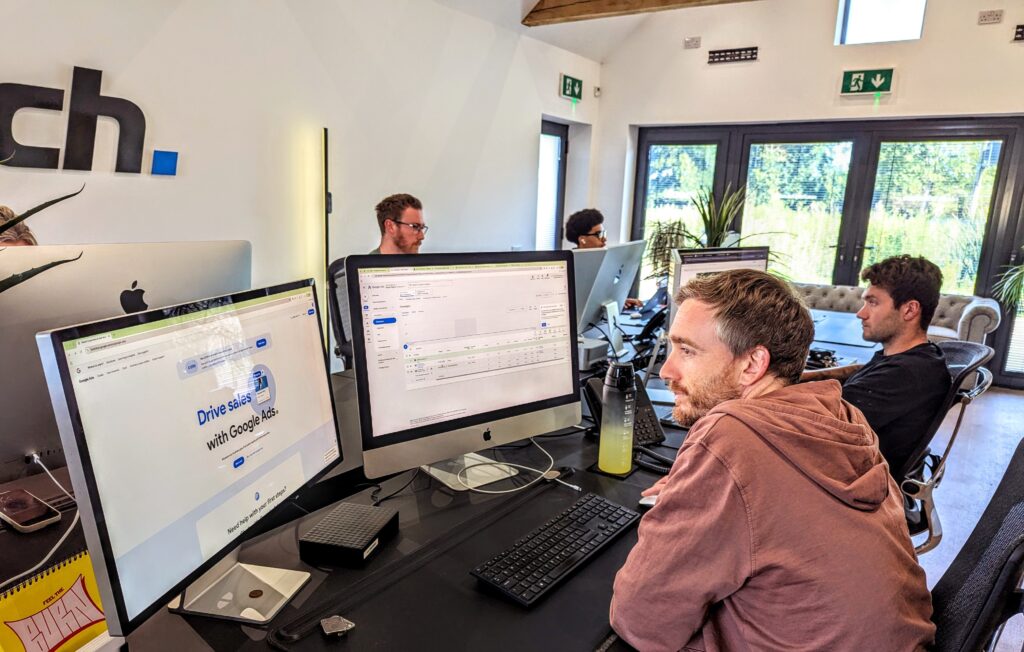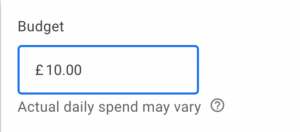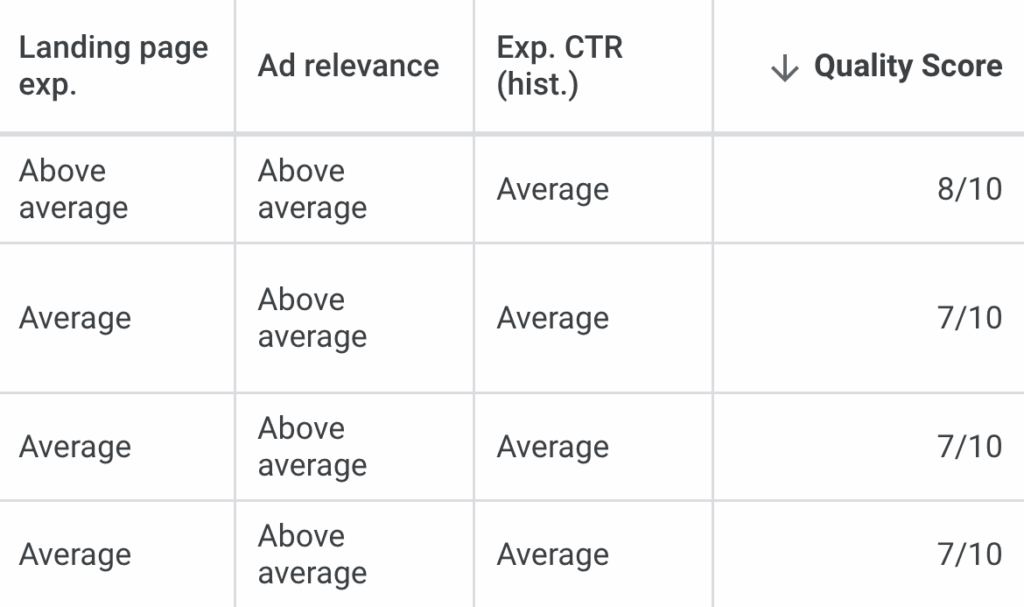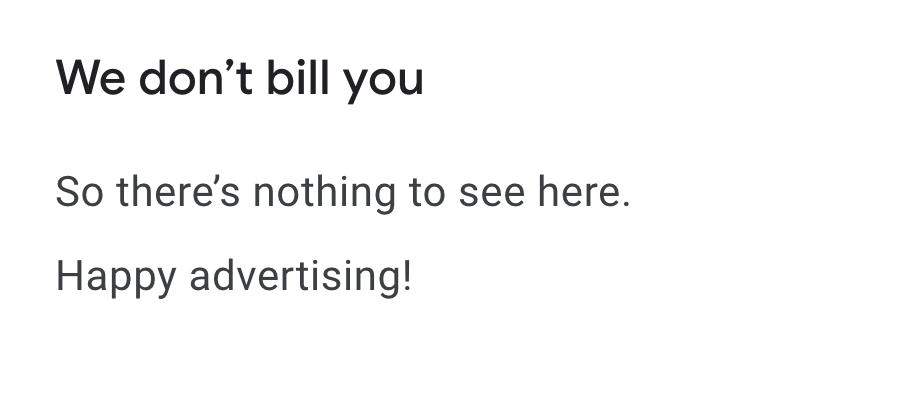
Did You Know?
Charities and non-profits can apply for a Google grant worth $10,000 in free ad spend per month.
If you are unfamiliar with the world of Google Ads, and how it works, it can be hard to gauge just how much it’s going to cost to run your campaigns. It’s important to know how much Google Ads is going to cost before you start so you can plan your budgets effectively and make sure Pay Per Click marketing of this kind is the best choice for your business.
The short answer here is that it can cost as much or as little as you want it to. The control you have over the budget means you can set things as low as a few pounds per day. However, the truth is that you’re unlikely to get the results you’re looking for if you do. That’s not to say it’s impossible to achieve success with a small budget, but this often depends on your business goals, experience and a lot of optimisation.
What Are The Direct Costs Of Google Ads?
Depending on how you go about running your Google Ads campaigns, there are up to two different direct costs. The first is the physical cost of the ads, which is typically paid per click, and goes directly to Google. Just how much each of these clicks is worth depends on a wide range of factors that we will dive into further down this article, but you will pay for this at regular intervals using a credit card, debit card or bank account that you link to the platform.
When you first start advertising, you will be charged quite frequently for small amounts. However, once Google verifies that your payment method is reliable, you will be charged when you hit your payment threshold or on the 1st of the month, whichever comes first. Your payment threshold will initially be set to something like £50, £200 or £500, but it’s possible to request a change to this in the settings.
The other cost comes if you’re considering PPC management from a marketing agency like Reach Digital. If you’re unsure where to start or you’re looking to get more from your current activity, this is often a good choice, but there will typically be a management fee involved. Some agencies will charge on an hourly basis, but we offer monthly contracts to help you plan for and manage your costs. Fees will vary depending on the size and scale of your advertising plans, so get in touch today to find out how we can help give your business a boost.
Can I Set A Budget For My Google Ads?

Yes. Each campaign that you launch will have its own budget, so that you can decide exactly how much you want to spend. This means that you can split your services or products into suitable campaigns and decide how much budget to give each one. With this in mind, you might want to put products with higher margins into a campaign with a bigger budget, whilst restricting the money spent on those with smaller margins a bit more.
What Should My Budget For Google Ads Be?
This is something that will be different for each and every business, so it’s hard to say. However, a general rule of thumb is to establish how much a conversion is worth to you and then set the budget so that you’re spending enough to gain around 30 of these conversions each month.
So, if you’re average Cost per Acquisition (CPA) is £2, a good starting budget would be £60 per month or just under £2 per day. This will enable Google to generate enough important data to complete its learnings as quickly as possible. If the budget isn’t high enough to achieve around 30 conversions per month, then this initial optimisation will take longer, and your campaigns will suffer due to the lack of data.
After a few months, you can always adjust the budget in line with your Return On Ad Spend, but the initial weeks represent an important time. This is why, if you are unsure of your average CPA, it’s always best to set the daily budget higher than your estimate and then reduce it later.
Budget Vs Cost
A quick note on the difference between the number you input as your budget and the actual amount you will be charged. The Budget is stipulated as a daily figure, but you will often see your daily cost shown as more than this. This is because Google will always look to exceed your budget on any given day if it thinks this will improve results.
For example, if your daily budget is exhausted but a search for a high-intent keyword is conducted, Google may still show your ad. However, it will never spend more than twice your daily budget, and your monthly cost will never exceed 30.4 times your budget.
How Is Google Ads Cost Determined?
The majority of campaigns will be charged on a pay-per-click basis, meaning that you will pay each time someone clicks on your ad in the search results. However, as mentioned above, exactly what you will pay for each of those clicks depends on a whole list of factors. Let’s take a look at them one by one:

Your Bid
Each time someone conducts a search on Google, a real-time auction takes place to establish which of the thousands of advertisers using Google Ads will have their ads shown and in what order. Your bid can be entered manually (not advised for beginners) or you can choose from a range of different automatic bidding strategies such as ‘Maximise Clicks’, ‘Maximise Conversions’, or ‘Target Cost Per Acquisition’.
Whichever you choose, your maximum bid will be set during the auction and will go a long way to determining what you pay for the forthcoming click.
Your Quality Score
Quality Score is something that is attributed to each of the keywords you are targeting and is made up of three separate elements. These are ‘Expected Click Through Rate’ – how likely people are to click your ad, Ad Relevance – how well your ad copy matches the keyword that’s being searched, and Landing Page Experience – how well your website landing page performs for users. All of these combine to create a Quality Score, and the higher the Quality Score for that keyword, the lower the cost.
Your Ad Rank
Ad Rank could be considered the most influential determinant of the price you will pay in an ad auction. It is calculated by multiplying your Bid by your Quality Score, and so the more you can optimise those two metrics, the lower your overall Cost Per Click (CPC) will be.
Bidding Strategy
Bidding strategy will impact the cost in two ways. Firstly, it determines whether you will be charged per click or in another way (like per 1,000 impressions in a Display or Video campaign). Secondly, the strategy you set will dictate which auctions your ad is entered into and when. For example, if you have set your strategy to ‘Maximise Clicks’, Google may choose to bid higher for a particular auction because there’s a high likelihood your ad will be clicked.
Competition
The more advertisers that are targeting the keyword in question, the higher the cost will be for that click. Niche keywords typically have lower CPCs because fewer people are bidding on them. It’s always a good idea to include long-tail keywords in your campaigns, alongside others with more competition, so you can discover which hidden gems can provide real value.
Location
Location can have a big say in how much you will pay during an auction, especially when Google believes there’s a high chance of a conversion. In this respect, a shoe shop in London will pay more for a keyword like ‘Shoreditch show stores’ than they would for something like ‘best shoe stores’. Plus, some locations are naturally more expensive than others. This will be the case if there is more competition or a higher value attached to a conversion there.
Device
The device can affect the ad auction in a similar way to location. If your keywords perform better on certain devices, Google will use this information to bid higher in those scenarios. Plus, different types of conversions naturally occur more on specific devices. Like the way you’re more likely to make a big purchase (car, flights, etc.) on a desktop and more likely to make in-the-moment buying decisions (like clothes in the sale) on your mobile.
Ad Structure
There are many different components of a Google Ad, and it’s usually the case that the more of these you take advantage of, the lower your Cost Per Click will be. Including elements such as Sitelinks and Structured Snippets will increase the space your ad takes up in the search results. This, in turn, is likely to lead to more clicks, increasing your expected Click Through Rate and improving your Quality Score.
Advanced Bid Adjustments
Whilst many of these factors are controlled by Google, Advanced Bid Adjustments offer a way for advertisers to have more of a say over how much they bid in an auction. Within the campaign settings, you can add manual increases or decreases for things like location, device, day of the week and time of the day to instruct Google to bid higher or lower when those situations arise.
For example, if the data tells you that people have higher basket values when they shop on your website after 9pm, adding an Advanced Bid Adjustment to increase your bids by 25% during these times will help you take advantage of this.
Are There Any Promotions To Reduce The Cost Of Google Ads?

It’s good to know that Google offers new advertisers the chance to earn some free ad credit, allowing them to test the impact of Google Ads without having to invest too much of their own money.
There are certain criteria that you need to consider but, essentially, depending on the amount you spend within your first 60 days, you could be eligible for up to £1,200 in free ad spend. Contact us today to see if you qualify.
Additionally, all charities and non-profits can apply for a Google Grant account and receive $10,000 to spend per month. There are some restrictions and guidelines to follow, but it’s a great way for charities to build awareness for free.
In summary, there are lots of things that can impact the cost of your Google Ads, some of which are controlled by Google and some are dictated by you, the advertiser. There can be two principal direct costs involved in getting Google Ads running for your business: the cost of the ads themselves – paid directly to Google – and the cost of any agency management fees.
If you would like some expert guidance to ensure you’re getting the most from your Google Ads, get in touch with us today and see how our experienced team can help with your Pay Per Click management.
In summary, there are lots of things that can impact the cost of your Google Ads, some of which are controlled by Google and some are dictated by you, the advertiser. There can be two principal direct costs involved in getting Google Ads running for your business: the cost of the ads themselves – paid directly to Google – and the cost of any agency management fees.
If you would like some expert guidance to ensure you’re getting the most from your Google Ads, get in touch with us today and see how our experienced team can help with your Pay Per Click management.

About the author
Chris Mayhew has great experience in a wide range of digital marketing practices, focussing predominantly on paid media. By implementing iterative A/B tests, he optimises Google and Meta Ad campaigns to maximise results.
Did you find this article useful? Share it with a friend or colleague